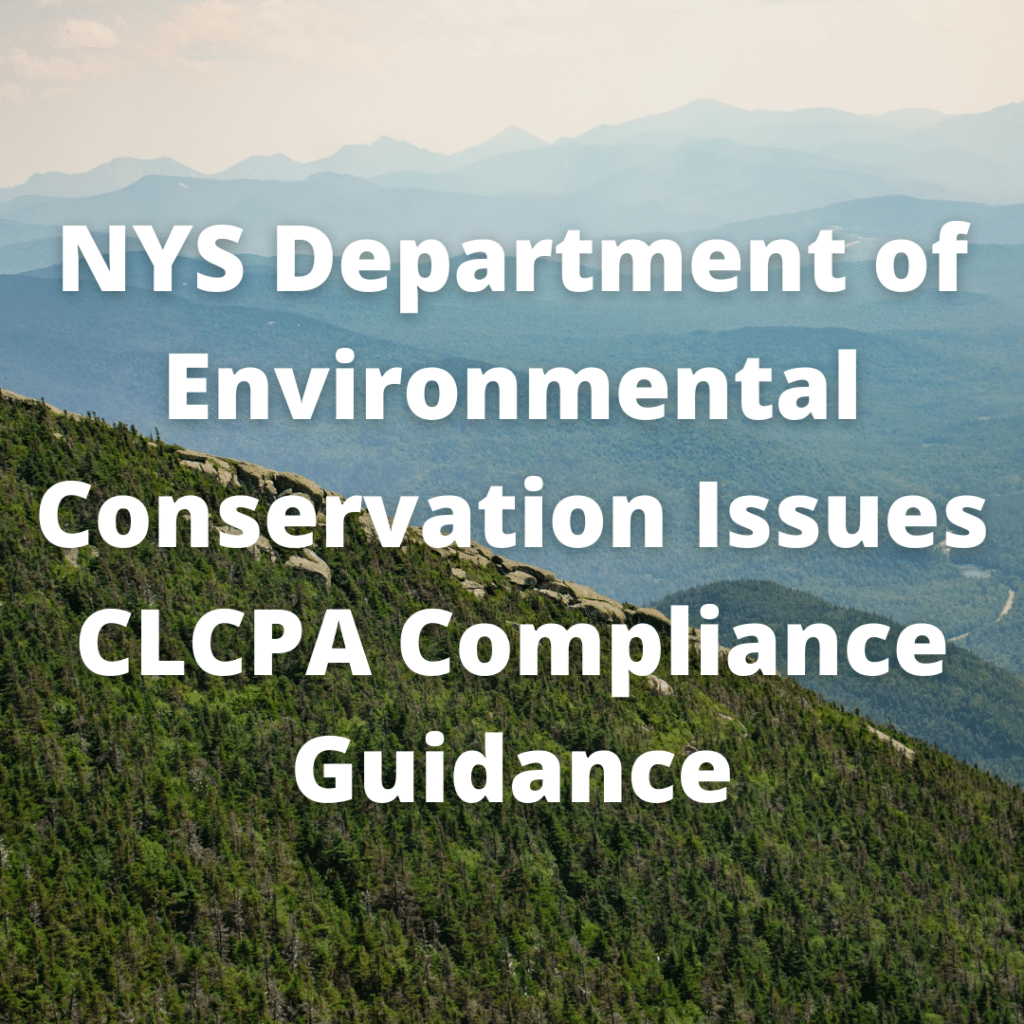Blog

NYS Department of Environmental Conservation Issues CLCPA Compliance Guidance
On December 8, 2021, the New York State Department of Environmental Conservation (DEC or the Department) issued two policies that incorporate climate change considerations into Departmental decision making and ensure compliance with the Climate Leadership and Community Protection Act of 2019 (CLCPA). As previously covered by the SPR Blog, the CLCPA requires DEC to establish statewide greenhouse gas (GHG) emissions limits that achieve emissions reductions of 40% by 2030 and 85% by 2050, compared to the baseline of 1990 GHG emissions. DEC promulgated regulations to adopt those GHG emission limits, which became effective in December 2020. The CLCPA also requires agencies to consider these GHG emission limits when issuing permits and other administrative approvals and decisions.
To that end, DEC’s Division of Air Resources (DAR) released DAR-21, a proposed program policy that outlines the compliance requirements for applicants seeking an air permit or registration. DEC is accepting public comments on DAR-21 until February 7, 2022.
Under the proposed DAR-21, Applicants for new, modified, or renewed Title V and Air State Facility permits must complete a CLCPA compliance analysis. Applicants for Air Facility Registrations will only be required to complete a compliance analysis where “DEC determines an analysis is necessary or appropriate to ensure CLCPA consistency.” These CLCPA compliance analyses must disclose: (1) the project’s direct GHG emissions on an actual emissions and potential-to-emit basis (i.e., tons per year); (2) all upstream and reasonably foreseeable downstream GHG emissions; and (3) projected GHG emissions through 2050.
For projects that would increase GHG emissions, DAR-21 requires applicants to propose alternatives and GHG mitigation measures. Potential mitigation measures may include financial mitigation (such as providing funds for GHG reduction projects in the community), technological mitigation (such as installation of carbon capture controls), operational mitigation (such as limits on hours of operation), and physical mitigation (such as tree planting).
DEC also released an updated version of Commissioner’s Policy 49 (CP-49) for public comment, which provides internal guidance to the Department regarding its responsibilities and procedures for complying with the CLCPA. DEC is also accepting public comments on CP-49 until February 7, 2022.
Under the proposed CP-49, Department offices must evaluate their practices and policies—including decisions concerning procurement, funding, contracts, vehicle use, travel, and waste—to determine if they minimize GHG emissions using the most up-to-date and authoritative assessments and future projections at the state, national, and global levels.
Importantly, CP-49 also applies to DEC’s review and decisions on “all major permit applications,” including those: (1) related to air emissions, liquefied natural gas and petroleum gas, solid waste, or industrial hazardous waste; (2) for facilities withdrawing and using over 20 million gallons of water per day for cooling purposes; (3) for projects involving energy production, generation, transmission, or storage; and (4) for sources and activities that result in GHG emissions directly or indirectly.
Finally, CP-49 provides guidance on the CLCPA requirement that DEC administrative decisions shall not disproportionately burden disadvantaged communities and shall prioritize reductions of GHG emissions and co-pollutants in disadvantaged communities. The State’s Climate Justice Working Group, as required by the CLCPA, is developing criteria for identifying disadvantaged communities, but CP-49 commits DEC to identifying such communities in the interim. DEC will provide further guidance on this topic through future revisions of the Commissioner’s Policy on Environmental Justice, CP-29.
DEC’s recent permitting decisions indicate that the Department had already begun incorporating CLCPA compliance into its decision-making before release of DAR-21 and CP-49. In October, DEC denied Danskammer Energy, LLC’s application for a Title V Air Permit to construct and operate a new natural gas-fired combined-cycle power plant. DEC’s denial was based upon the project’s failure to comply with the CLCPA and interference with attainment of statewide GHG emission limits. Danskammer Energy, LLC subsequently filed a request for an adjudicatory hearing to review the decision. DEC also denied Astoria Gas Turbine Power, LLC’s Title V Air Permit application on similar grounds. The project as proposed would consist of a 437-megawatt simple cycle dual fuel fossil fuel-fired peaking combustion turbine generator. Astoria Gas Turbine Power, LLC timely filed a request for an adjudicatory hearing, seeking review of DEC’s denial.